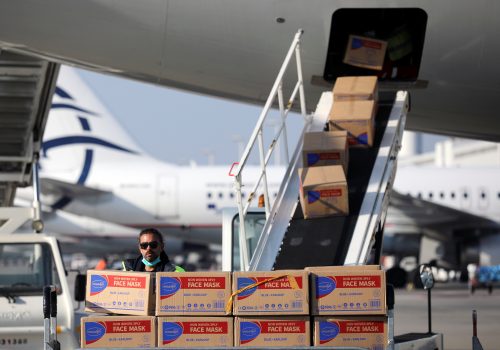CORONAVIRUS ALERT 3/23/2020
The Atlantic Council’s Coronavirus Alert is a regular summary of policy, economic, and business events around the emergency. To stay updated, sign up to the Coronavirus Alert here.
Summary:
New York now accounts for about half of all coronavirus cases in the United States, with deaths from the outbreak exceeding 15,000 worldwide. The US Federal Reserve launched a “whatever-it-takes” series of measures including bond purchases to shield companies and individuals from the economic impact of the pandemic. Governments around the globe ramped up restrictions, as Italy and Spain saw the death toll continue to rise.
Statistics:
There are now more than 350,000 cases worldwide in almost 170 countries and territories; more than 15,000 people have died.
QUOTE: “The frontline is not in hospitals. The frontline is where you are, out on the streets,” Dr. Colm Harrington writes in a letter to The Irish Times. “We do not have medicine to treat this virus. Prevention is the only way to fight this. Prevention is up to every one of us.”
HEALTH AND SCIENCE:
- New York City and its suburbs now account for about 5 percent of worldwide cases of coronavirus, The New York Times reported, describing that as an “alarming milestone.” Governor Andrew M. Cuomo pleaded with the federal government to bring the production of medical supplies under national control, the newspaper said. More than 15,000 cases have now been registered in New York State, about half of cases in the United States, the paper reported.
- Ohio and Louisiana issued “stay at home” orders, while governments worldwide started or extended national shutdowns, The Washington Post reported. The World Health Organization (WHO) said even that may not be enough. “What we really need to focus on is finding those who are sick, those who have the virus, and isolate them, find their contacts and isolate them,” the Post cited Mike Ryan, WHO’s chief emergency expert, as saying in a BBC interview.
- The newspaper describes the reaction of governors and mayors as “uproar and alarm” in response to “confusing statements about the federal government’s scramble to confront the crisis.”
- The WHO has launched a “global megatrial” of the four most promising treatments for coronavirus, the journal Science reported. They include combination therapy used against HIV, a malaria treatment, and a new antiviral medicine whose promise against Ebola faded last year, Science said. The trial, designed to be as simple as possible so even hospitals that are overwhelmed by the outbreak can take part, could include thousands of people in dozens of countries, the journal reported.
- The death toll in both Italy and Spain is growing more quickly than it did in China during the same stage of the coronavirus outbreak, the Financial Times reported. Europe now accounts for 75 percent of new daily cases, the newspaper said. Coronavirus killed more than 2,000 people over March 21 and 22 in Italy and Spain, Bloomberg said.
- Italy increased restrictions, shutting down non-essential business activity until April 3, Reuters reported. Cuba has sent fifty-two doctors and nurses to Italy to help following a request by Lombardy, the worst-affected region of the country, Reuters reported. The communist nation’s doctors were at the frontline in fighting cholera in Haiti and Ebola in West Africa in the 2010s, the news agency said.
- Medical staff in Europe face shortages of equipment, with doctors and nurses at some Spanish hospitals resorting to taping trash bags to themselves after running out of disposable coats, Bloomberg reported. Healthcare in Spain and Italy is “buckling in a way not seen in peacetime,” the news service said.
- The UK government will tighten restrictions unless people follow social-distancing requirements after people gathered in groups in parks and on beaches despite the need to stay two meters apart from each other when outside, the Financial Times reported. Deaths from coronavirus increased by forty-eight on March 22, with victims aged between eighteen and 102, taking the total in the country to 281, the newspaper said.
- The “upwards curve” of new coronavirus infections is flattening for the first time in Germany, Sky News cites the head of the country’s public health institute as saying.
- “Coronavirus Drives the US and China Deeper Into Global Power Struggle,” reads a headline in The New York Times.
- Mainland China reported a drop in the daily number of new coronavirus cases, reversing four days in a row of increases, Reuters reported. All of the thirty-nine new cases reported on March 22 were travelers returning from abroad, many of them Chinese students heading home, the news service said.
- New Zealand will go into a countrywide lockdown except for essential services at the end of March 25 for four weeks, with schools closing on March 24, Radio New Zealand reported. Non-essential services closed in Australia at midday on March 23, although schools remain open unless parents prefer to keep their children away, the BBC reported.
- Singapore will shut its borders to short-term visitors and some foreign workers from the end of March 23 after the island nation confirmed its first two deaths from coronavirus, Al Jazeera reported.
- Millions of people in India have been put under lockdown until the end of the month after a sudden increase in coronavirus cases prompted authorities to step up containment efforts, CNN reported. India has 415 cases of coronavirus, including seven deaths, CNN said.
- The coronavirus crisis could last until October, Mexico’s health official tasked with managing the country’s response to the pandemic, the Financial Times reported. Mexico’s tally of those affected rose to 251 confirmed and 697 suspected cases, although only a small number of tests have been carried out, the FT said.
- “Sheltering in place works like this: You don’t give it to anyone—You don’t get it from anyone. Common sense, no?” CNN reported actor Tom Hanks as saying. “Two weeks after our first symptoms and we feel better,” CNN cites the actor as saying of his wife Rita Wilson and him on Twitter.
- Harvey Weinstein, the convicted sex offender and former Hollywood producer, has tested positive for coronavirus while in Wende Correctional Facility near Buffalo in upstate New York, the BBC reported.
QUOTE: “Containment is no longer realistic in some areas of the U.S., but in other places it may still be possible,” Scott Gottlieb writes in The Wall Street Journal. “Soon the U.S. will be able to do 75,000 tests a day. That will make changes in strategy possible.”
FINANCE AND ECONOMICS:
- The Fed said it will buy as much debt as necessary to cushion the blow of the coronavirus pandemic, The New York Times reported, describing that and other measures announced March 23 as a “whatever-it-takes” approach. “Aggressive efforts must be taken across the public and private sectors to limit the losses to jobs and incomes and to promote a swift recovery once the disruptions abate,” the newspaper cited the central bank as saying.
- Progress on the $1.8 trillion US economic stimulus bill stalled as Democrats blocked the measure on the grounds it’s too favorable to corporations, The Washington Post reported. Talks continued even though the forty-seven senators for, forty-seven against tally falls short of the sixty votes necessary to move forward, the Post said. Majority Leader Mitch McConnell (R-KY) set another procedural vote for March 23, the newspaper said.
- The main sticking point for the bill is oversight of a $500 billion loan program, a key component of the stimulus package, the newspaper reported. The Trump administration and Senate Republicans want the Treasury Department to disburse the loans, but Democrats balk at giving Treasury Secretary Steven Mnuchin so much authority, the paper said.
- Markets were rattled as the delay to the economic package sent US futures, global stocks, and oil prices lower, The Wall Street Journal reported. Most stock benchmarks fell in the Asia-Pacific region, the newspaper said.
- The US commercial mortgages market is nearing collapse, Bloomberg cited real-estate billionaire Tom Barrack as saying. Barrack predicted a “domino effect” with an economic impact that could dwarf the Great Depression unless governments and banks act to quickly to stop borrowers from defaulting, the news service reported, citing a white paper posted on the publishing platform Medium on March 22.
- Some of the world’s best capitalized and biggest companies, Airbus and Royal Dutch Shell among them, are in a scramble for cash, as they cut costs, cancel share buybacks, cut dividends to investors, or ask lenders for credit, The Wall Street Journal reported.
- Australia announced its third economic stimulus package in ten days, taking the total of measures to $109 billion, the Financial Times reported.
- The cabinet of German Chancellor Angela Merkel, in quarantine after she learned that a doctor who gave her a pneumonia injection on March 20 tested positive for coronavirus, will meet on March 23 to discuss a $160 billion economic stimulus package, NPR reported. Germany barred gatherings of more than two people, NPR said.
- “[T]he Group of 20 (G20) has agreed to hold a virtual summit of its leaders this week,” writes The Atlantic Council’s Hung Tran. “Either it succeeds in presenting a plausible global approach to deal with the pandemic and its impact, thus stabilizing public confidence and financial markets, or it can leave the world rudderless in the storm.”
QUOTE: “The key uncertainty is how long Europe and the U.S. will be locked down,” said Adrian Zuercher, head of asset allocation for the Asia-Pacific region at UBS Global Wealth Management, The Wall Street Journal reported. “Lower interest rates and stimulus packages are not helping you if people can’t go out and spend or even if they can but they don’t want to because they’re scared.”
BUSINESS AND TRAVEL:
- Australia and Canada pulled out of the Tokyo 2020 Olympic Games, as its organizers face global pressure to postpone the event, Reuters reported. That would be the first time that has happened in the modern games’ 124-year history, the news agency said.
- The CEO of Marriott, the world’s biggest hotel group, said the economic impact of coronavirus is worse than the 9/11 attacks and the financial crisis combined as demand for travel collapses, The Wall Street Journal reported. The hotelier will furlough about two in three of its 4,000 corporate workers at its Bethesda headquarters and about the same proportion of overseas staff in similar posts, the newspaper said.
- JetBlue Airways plans to operate less than half its scheduled services this week as it cuts hundreds of flights, CNBC reported. Airlines are requesting $58 billion in government, half cash and half loans, as the pandemic and efforts to contain it continue to slash demand for travel, CNBC said.
- McDonald’s will close all its restaurants in the UK and Ireland by 7pm local time on March 23 to ensure the safety of customers and workers, The Guardian reported.
QUOTE: “[I]nstead of collaborating on the manufacture and distribution of emergency gear, Washington and Beijing are engaged in a blame-game about the source of the virus,” says an article in the Bloomberg New Economy newsletter. “These actions may have calamitous consequences, and not just for the fight against a once-in-a-century virus. It also augurs poorly for global struggles against climate change and weapons proliferation, not to mention globalization itself.”
RESOURCES
- Johns Hopkins University interactive web-based dashboard to visualize and track reported cases in real-time.
- CDC provides frequent updates and background information on Coronavirus.
- The World Health Organization daily situation reports.
- Harvard Business Review guidance on managing the emergency for corporate decisionmakers.
- The Society for Human Resource Management resources on managing communicable diseases.
- The Wall Street Journal has a useful guide to travel and travel insurance.
- State Department Travel Advisory for China.



